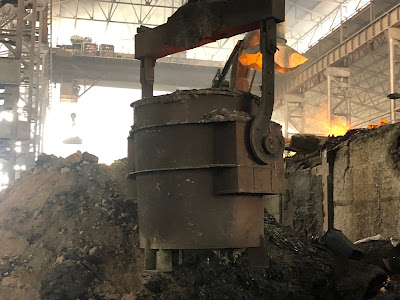Any iron made by Drupthop Thangtong Gyalpo is the most sought after steel
in the Vajrayana Buddhist community. This is because of the fact that Drupthop Thangtong Gyalpo is one of the most
significant Mahāsiddhas of Tibet. Drupthop
Thangtong Gyalpo was a yogi, philosopher, poet, exorcist, teacher, architect,
engineer, painter, sculptor, doctor, treasure revealer and an iron chain
suspension bridge builder, a universal genius with supernatural abilities.
 |
| (Thangtong Gyalpo's Statue at our company's monastery at Ramitey) |
Amaxingly, Drupthop Thangtong Gyalpo originated
the use of iron chains in his own version of simple suspension bridges and was the first person to make iron chain bridge in the
world. All iron made by Drupthop Thangtong Gyalpo was processed through his own
power and skills. Many iron chains were processed in Bhutan and taken to
Tibet.
 |
| (On Drupthop Thangtong Gyalpo's bridge at Paro Tashoka) |
Thangtong Gyalpo’s idea of making bridge was motivated by an incident at
the ferry over Kyichu by Lhasa.
Thangtong Gyalpo wanted to cross the river but was refused by the
ferryman because of his apperance (being dressed as a begger) and after a blow on his head
with the rudder was thrown overboard. This endowed him with an insight into the
dilemma of the poor and the injustices against them. He vowed to built a bridge
at this very place, so that all people without discrimanation could cross the
river. As determined he had built a iron chain bridge over.
Many Rinpoches, Lama and even layman look for Thangtong Gyalpo’s iron as
it is a relic by itself. It is used for making Phurba which is believed to have extra blessing and power. In
the past, many iron chain links got stolen and sold in the market. Today whatever
is left were preserved in the monastery
with proper documentation.
 |
| (Dhupthop Thangtong Gyalpo's iron chain perserved at Gomphu Kora Monastery) |
With the demand of Thangtong Gyalpo’s iron still in rise, that
directly threatens the existing chains
kept in the monastery in various part of the country, I have taken initiative
to produce some iron bar using Drupthop Thangtong Gyalpo’s semi processed iron
ores collected from Drupthops three smelting places in Paro by Lopen Naphey.
I am very happy to state here that I am very sucessful in making the
Drupthop’s iron in the modern steel plant at Lhaki Steels & Rolling Pvt.
Limited. The Process:
Semi
processed iron ores of Drupthop Thangtong Gyalpo collected from three smelting
places in Paro.
Charging of 70 kg sacred iron ores that will have iron content of 6.8 kg of iron in the furnace.
Stiring of
metal and removing of slag.
Boiling of
metal charging 3.5 MVA of power in a 8 MT induction Furnace
Final state
of molten metal after adding metallurgical flux, Silico Manganese, Aluminiun shot and Ferro Silicon.
Final temperature of molten metal 1,662 degrees celcius before pouring into the ladle
Pouring of
molten metal into the ladle for transferring to Continuous Casting Machine
Purging of
Nitrogen gas from bottom of ladle with a task to fully homogenized the chemical composition, equalizing of metal temperature and removal of any foreign particles.
Placing and
pouring molten metal into tundish at CCM.
Temperature
of metal at CCM for casting of billets
Pouring molten metal into ossilation copper mould to take square shape of billets
Casting of
billet at CCM
Testing of
chemical composition using spectrometer
Rolling of steel in the automatic mill
Final Rolled steel in square shape
Final product
with ingredient of Drupthop Thangtong Gyalpo’s iron and blessed by his
Also made a replica of Drupthop Thangtong Gyalpo's Chain link without forging ends.
As I am in possession of Drupthop Thangtong Gyalpo's Tooth and Cloth Relics, may be I am destined to make this iron.
To know more of Drupthop Thangtong Gyalpo please copy below link and get the free pdf copy from the net. This was published by Center of Bhutan Studies.
May holder of this iron be blessed






















